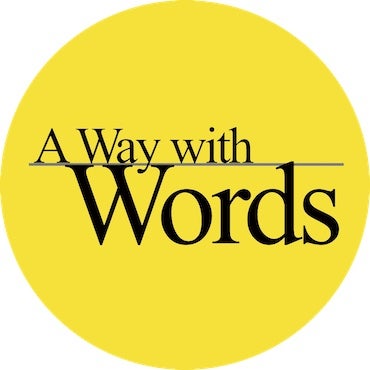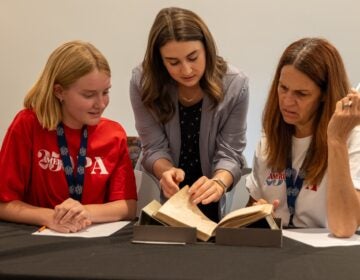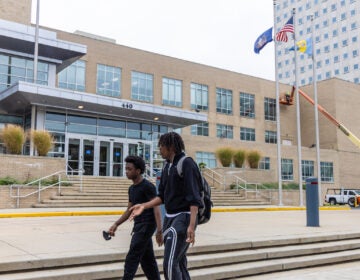‘Working educators’ caucus challenges status quo in Philadelphia teachers union
Listen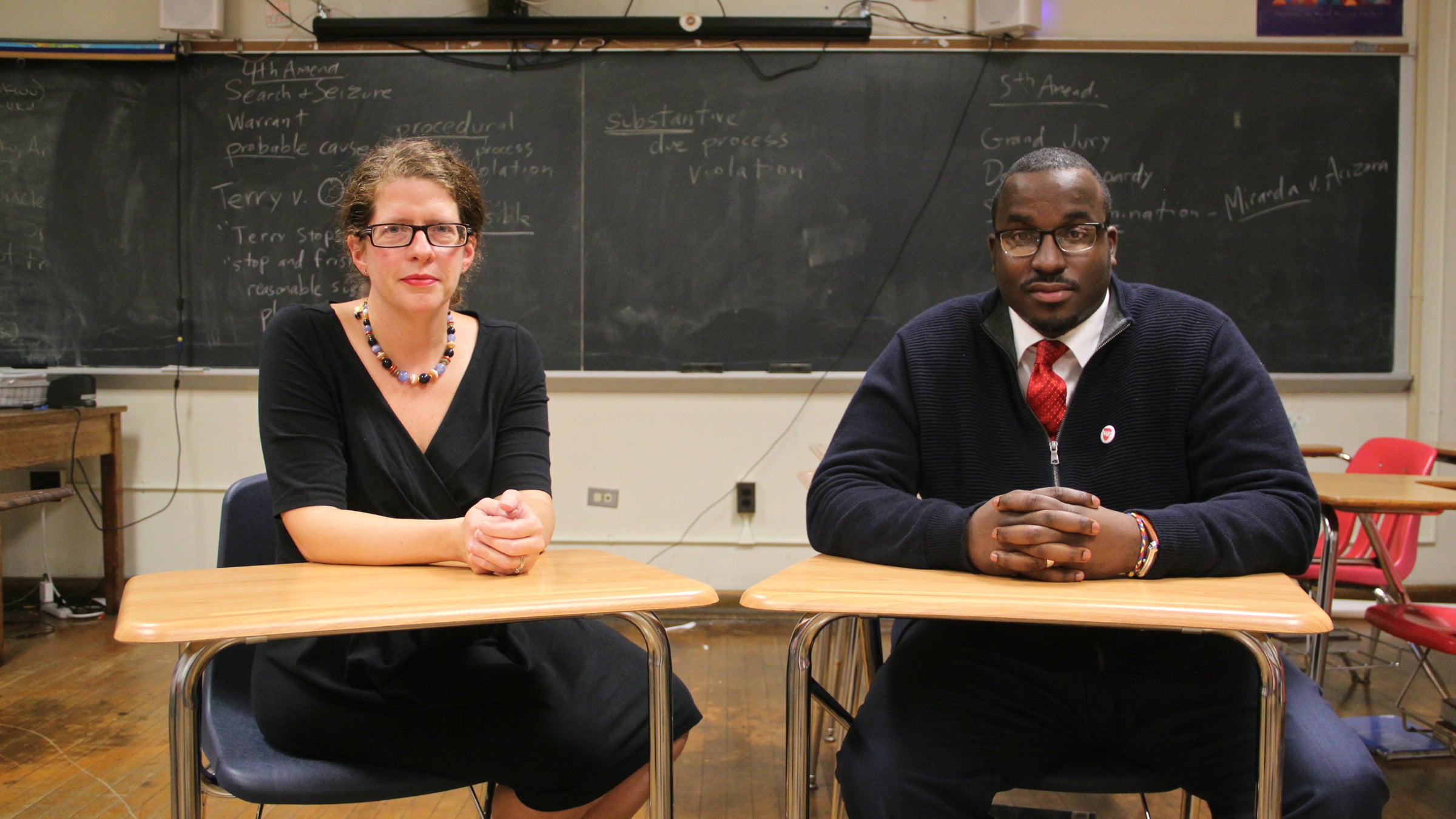
Feltonville Arts and Sciences teacher Amy Roat and Central High School history teacher Yaasiyn Muhammad are challenging the old guard within the Philadelphia Federation of Teachers. (Emma Lee/WHYY)
The leadership and direction of the politically influential Philadelphia Federation of Teachers will be up for grabs over the next few weeks.
The incumbent leadership slate — known as the Collective Bargaining Team — is seeing its most robust challenge in decades from a rank-and-file division that calls itself the Caucus of Working Educators, also known as WE.
WE prides itself as a proponent of “social-justice unionism” that aims to place trauma-informed care of students at the core of its agenda.
“We have to address those issues of poverty, or things will never get better in the classroom. And I think that is a big scary notion, but 11,000 caring teachers and other professionals can do this,” said Amy Roat, WE’s nominee for union president.
WE formed two years ago, in part, it believes that existing leaders are too disconnected from the classroom experience.
“The CB Team, the majority of them have not been in the classroom for two, three decades. We would like to have teachers floating in and out of leadership positions,” said Yaasiyn Muhammed, WE’s chosen vice president.
Roat and Muhammed draw inspiration from the victories of underdog caucuses that have risen to power in Chicago, Seattle, Los Angeles and San Francisco.
“Status quo unionism is top-down, business model unionism,” said Muhammed, who teaches history at Central High. “And we’re talking about unionism that’s ground-up, unionism that’s about ideas, that’s about action.”
Setting alarm for a ‘sleeping giant’
A change in union leadership could have a huge impact on the 130,000 Philadelphia children who attend district-run schools in the city. WE leaders say existing leadership has “put members to sleep,” and that their caucus will “awaken a sleeping giant” that will organize around the issues that they say most affect kids inside and outside of schools.
“I want to explode some of the notions that we accept in our building, like standardized testing as the most important thing. And I want to talk about things that would really help my kids,” said Roat. “I teach English language learners. Those issues are important to me. The parents are concerned with things about immigration and how they can get access to health care.”
Roat and fellow Feltonville teacher Kelley Collings have been outspoken proponents of parents opting-out of standardized testings. Opt-out rates at Feltonville soared in the wake of their advocacy.
Since its founding, WE has shown itself to be an extremely tech-savvy organization, capable of quickly creating websites and shaping an ideological conversation on social media. Members have also been increasingly visible at School Reform Commission meetings, where they’ve frequently organized grading parties and passionately testified — sometimes in song and rhyme.
Part of WE’s frustration with the CB Team is that members have been working under an expired contract since August of 2013 and haven’t seen an across-the-board pay raise in four years — all while staff levels and school conditions have worsened.
“The only thing that can explain that is a lack of leadership,” said Roat.
Decades of challenges
Through this time, though, the district has operated on austerity budgets and has sought major givebacks by the union — which incumbent president Jerry Jordan has successfully avoided.
“They think you can go to a table, and you can sit there and bang, and you can scream at the opposite side of the table, and that instantly they’ll say, ‘Oh, OK, we’re going to drop that.'” said Jordan. “It doesn’t work that way.”
Jordan, a product of West Philadelphia public schools, taught special education in the district for about a decade, beginning in the mid-’70s. He became a full-time union staffer in 1987.
“I, literally — when I became building rep — would read the contract in bed before I went to sleep,” he said. “And I would take sections at a time so I would be familiar with what was in there.”
He became head of the union in 2007 when Ted Kirsch was elected leader of the Pennsylvania chapter of the American Federation of Teachers. Jordan was easily elected PFT president in 2008, and ran unopposed in 2012.
Jordan’s Collective Bargaining Team has been in power since 1983.
“I think people should look at what we’ve done and look at the kind of challenges that we have faced and been very level-headed in our response to things that have been absolutely unheard of,” said Jordan.
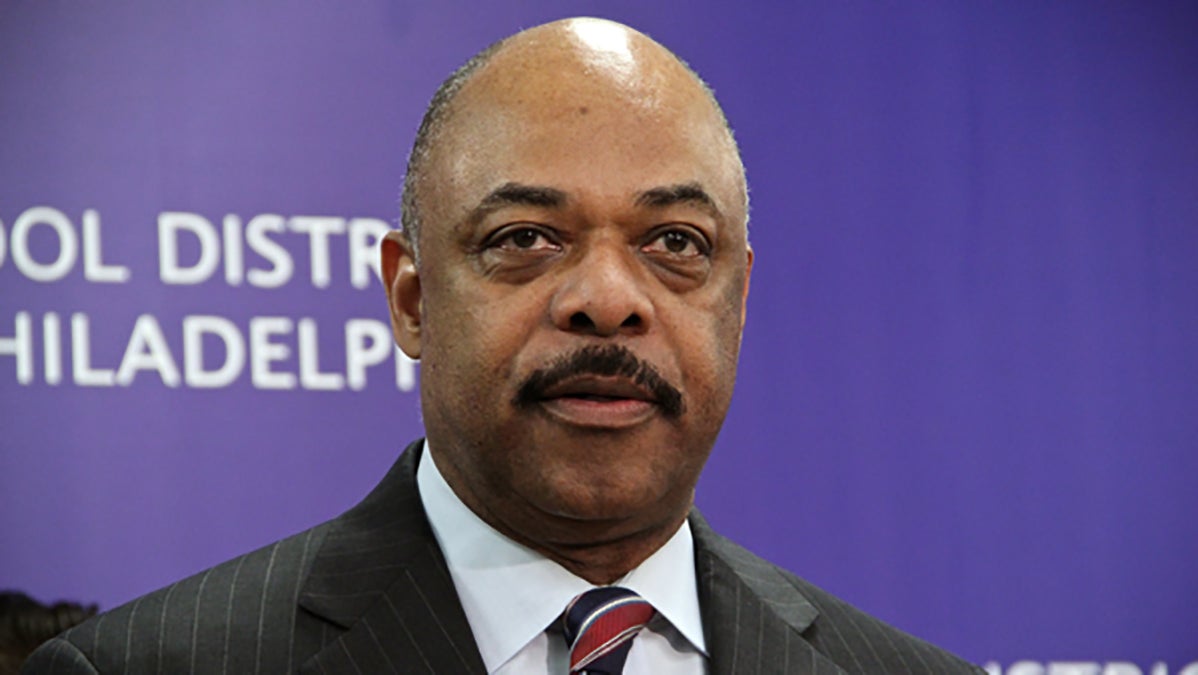 Jerry Jordan has headed the Philadelphia Federation of Teachers since 2007. (Emma Lee/WHYY)
Jerry Jordan has headed the Philadelphia Federation of Teachers since 2007. (Emma Lee/WHYY)
In recent years, despite the absence of a contract, Jordan has overseen a series of major political and judicial victories.
In 2014, he faced the most aggressive action against the union in recent memory when the School Reform Commission voted unilaterally to cancel its contract with teachers and impose health care concessions.
“If we went on strike, the SRC would have gotten exactly what they wanted because that would have meant that we would have been at an impasse legally.”
The state also has the authority to revoke certifications if teachers in Philadelphia strike.
Bypassing that option, Jordan has so far successfully beat back the SRC’s move through the court system. The PFT won in Common Pleas Court and Commonwealth Court — with a decision still awaited in state Supreme Court.
In the meantime, Jordan has refused to ink a contract that doesn’t mandate a full-time guidance counselor in every school — a point he says diminishes the notion that CB isn’t a “social justice union.”
Under Jordan’s leadership, the union also poured a ton of time and money into the campaigns of Gov. Tom Wolf and Mayor Jim Kenney — Democrats who are philosophically very much in line with the teachers union in the larger education reform debate.
To Jordan’s pleasure, reform-minded, pro-charter advocates fear that these elections have brought about a climate which has seriously eroded their agenda.
“We were out canvassing neighborhoods on Saturdays and Sundays, knocking on doors, talking to people, encouraging them to get out the vote,” said Jordan. “And some of the members of the WE caucus were there, but not many.”
WE leaders dispute that characterization. They say they vigorously canvassed for Wolf and Kenney as well. In last year’s City Council race, Jordan chose not to endorse the only teacher on the ballot, Kristin Combs, a WE member.
Kenney is not endorsing either side in the PFT race.
United in estimation of charters
Larger politics aside, WE leaders say Jordan has done little to inspire most members to exercise their own power and professionalism.
“I think they’re turned off by the union. I think they’ve never been asked, ‘What do you think?’ or ‘What do you want to do?’ ” said Roat. “And that’s a real stark contrast between CB and WE. We do care what you think. We think the answers lie with the members.”
Vice presidential candidate Muhammed bristled at the notion that the caucus lacked the experience and political connections necessary to competently run the union.
“We know who to talk to to find out what we don’t know,” he said.
The two factions have much in common — most fervently in their dismissal of the value of charter schools, whose rise has slashed in half the size of the union.
Both also express distrust of Superintendent William Hite, and emphasize that union interests dovetail with those of students.
Members will receive ballots by mail on Feb. 4. They have until Feb. 24 to return them to the American Arbitration Association, which runs the contest. Elections in past years were plagued by low turnout.
Roat believes it is either side’s race to win.
“We have a few hundred WE loyalists,” she said. “There are a few hundred CB loyalists, and the other 10,000 people are up for grabs.”
WHYY is your source for fact-based, in-depth journalism and information. As a nonprofit organization, we rely on financial support from readers like you. Please give today.

